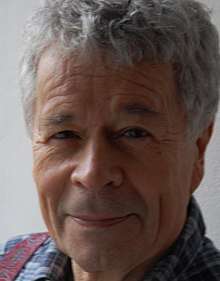Robert Eagle (filmmaker)
Robert Eagle (born 30 April 1948), is a British writer, producer and director of documentary and drama for film and television,[1] now working in fine art.
Robert Eagle | |
|---|---|
 | |
| Born | Andrew Robert Martin Eagle 30 April 1948 Norwich, England |
| Nationality | British |
| Occupation | Writer, director and art dealer |
| Known for | Guru Busters; Alternative Medicine; Modern British art |
Early life
Robert Eagle was educated at Gresham's School[2] and Magdalene College, Cambridge.
Work
His documentary Guru Busters[3], about the campaign to eradicate superstition, religious fraud and quackery in India, provoked controversy with its vivid, occasionally disturbing, depiction of the work of leading Indian rationalist campaigners such as Prabir Ghosh, Sanal Edamaruku and Basava Premanand. Followers of the guru Satya Sai Baba attempted, unsuccessfully, to prevent the documentary being broadcast in South Africa[4] and Australia, complaining about the film's use of previously suppressed video material that allegedly showed the guru using legerdemain trickery.[5] Eagle continued to investigate supposedly supernatural phenomena as series producer of Supernatural Science for the BBC.
Science, medicine, controversy and fraud are recurrent themes in his work. Back in 1980 his book Alternative Medicine – a guide to the medical underground won the Medical Journalists Association's special award. He went on to write and present two series of programmes on alternative and traditional medicine for BBC Radio 4. He was series editor of the innovative Channel 4 television health series Well Being.[6] He also produced many programmes for young people on science and art, including the series Picture This! and Big Questions for Channel 4 and Video & Chips for ITV and a television dramatisation of Jamila Gavin's novel Grandpa Chatterji.
In September 2009, he was severely injured while flying a vintage Auster aircraft, but survived the accident.<refAir Accident Investigation report</ref> In 2013 Eagle quit the film and television industry to pursue a new career in fine art, focusing on the work of British 20th century painters. His projects include a study of the "forgotten" British artist, David Rolt (1916–1985).[7]
Filmography
- Guru Busters (Channel 4 UK documentary) [8]
- Supernatural Science (BBC Worldwide documentary series)
- The Nuclear Boy Scout (Channel 4 UK documentary)
- The Solomon Treasures (National Geographic, Arte, History Channel documentary) also titled in USA as Decoding Bible Relics and in France as Les Trésors Perdus de Salomon
- The Dancer's Body (BBC documentary series)
- Big Quesions (Channel 4 UK educational series)
- Grandpa Chatterji (Channel 4 UK drama)
- Conjoined Twins (BBC Horizon documentary)
- Robo Sapiens (Discovery International documentary)
- Space the Final Junkyard (Channel 4/TLC documentary)
- Sun Storm (Channel 4/TLC documentary)
- I shouldn't be alive – Science of Survival (Discovery USA)
- Piece of Cake[9]
Selected publications
- Guide to Alternative Medicine (BBC Books)
- How they made Piece of Cake (Boxtree)
- Herbs – Useful Plants (BBC Books)
- Eating and Allergy (Doubleday (USA), Thorsons, Futura (UK))
- Alternative Medicine – a guide to the medical underground (Futura)
- Taking the Strain (BBC Books)
- Today's Health Service (Channel 4)
- Well Being (Penguin)
References
- British Film Institute database
- Old Greshamian Club Book (Cheverton & Son Ltd., 1999), p. 42
- Excerpts from documentary
- Report from Freedom of Expression Institute, South Africa
- Suppressed Doordarshan news footage shown in "Guru Busters" documentary,
- Patricia Holland Broadcasting and the NHS in the Thatcherite 1980s 2013, 1137313226, p.96 "The series was part of the expanding genre of informal consumer programming, creating an easy relationship between the doctor/presenter and the audience. However, Producer Robert Eagle added that he also aimed to 'understand outside pressures... (which) make individuals more vulnerable... ..."
- Gallery news report
- Excerpts from documentary
- Piece of Cake summary at IMdB
External links
- Eagle & Eagle TV web site
- Robert Eagle Fine Art web site